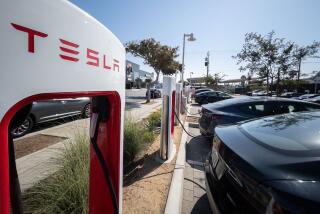Chevy Volt dealers inflate prices, take tax credits
Car sales may be in a slump, but the hybrid-electric Chevrolet Volts are hot, and that’s leading to shortages — and in some cases extreme dealer markups.
Several dealerships, including at least one in California, have priced new Volts more than $20,000 above General Motors Co.’s suggested $41,000 retail tag. Others are selling the vehicles as used, claiming a $7,500 tax credit for themselves and leaving the eventual buyers ineligible.
And there’s not much that GM or regulators can do about it.
“We want our dealers to be transparent about the whole sales process,” Volt spokesman Rob Peterson said. “But they are independent franchises. They can set their own prices.”
High fuel prices have increased demand for the vehicle, which can get 93 mpg-equivalent on battery power and 37 mpg on gasoline. GM’s decision to gradually roll out the vehicle a few states at a time is also causing a supply crunch. The automaker expects to produce only about 10,000 Volts this year, rising to 45,000 in 2012.
Town & Country Chevrolet in Milwaukie, Ore., is asking $51,999 for a 2011 Volt — “pre-owned” with less than 100 miles — because local demand is high, a dealership manager said.
At one lot in Southern California, a Volt with less than 50 miles on the odometer was marked at nearly $50,000.
Glendale Hyundai has four used Volts, all with low mileage, priced at $44,995 in what might seem like a bargain compared with some other dealers’ prices. But customers interested in the vehicles, which were bought at auction from a used-car dealer, will not be eligible for the $7,500 federal credit, according to a salesman who declined to give his full name.
Managers at the Glendale dealership could not be reached to comment on who would claim the credit, which is available to the first 200,000 Volt buyers.
Mark Modica, an investigator for the watchdog group National Legal and Policy Center, said dealerships are buying Volts from other dealers, claiming first title to qualify for the incentive, and then reselling the vehicles at inflated prices.
He wrote in a blog post that a Chicago Chevrolet dealer who planned to apply for the subsidy was selling a Volt as used with 10 miles on the meter.
Dealers are legally allowed to title a car to themselves and thus qualify for the credit, though they have to pay a use tax, according to the California DMV.
GM’s Peterson called the notion of dealers gaming the tax credit an “exaggerated claim” because no customers have complained.
Peterson said that these dealer-to-dealer Volt sales are rare — he knows of just 10 nationwide between Chevrolet dealers — and that they are primarily a way for dealers in states not yet reached by the official rollout to get a hold of the vehicle. Those dealers are showcasing the Volts to entice future customers waiting for the next batch of models, he said.
“We’re not encouraging our non-launch market dealers to do this,” he said. “We’ve asked our dealers to be patient and wait until we go nationwide this year. But we know that some of them are a little more enthusiastic.”
Dealers that are planning to claim the Volt tax credit for themselves are not likely to hide the fact from potential buyers, said Bill Visnic, senior analyst with Edmunds.com. Passing off the vehicles as new would be “a fairly overt act of deception,” he said — “basically fraud.”
“The idea is to prey on the desperation of people who want to buy the car,” he said. “It has all these conspiracy elements. But most people will know exactly what they’re entitled to, so it’s hard to imagine that this is going to be much of a widespread problem.”
To avoid accusations of price-gouging and a potential consumer backlash, some major chains, such as AutoNation, are asking their Chevrolet dealers not to charge a premium on the Volt.
“There was a lot of hand-wringing about it early on — that it was just a question of how much over MSRP dealers were going to go,” Visnic said.
The markups got so high in some cases that GM took the unusual step of encouraging some dealers to lower the prices.
“We view the Volt as much bigger than a short-term solution,” Peterson said. “If dealerships take the long view on this, they’ll reap the rewards.”
Michael Thwaite, an electric vehicle enthusiast who drives a Tesla Roadster and a BMW Mini E, is still interested in the Volt. For now, the markups and vehicle flipping don’t seem to have turned off potential buyers, he said.
“It looks to me like capitalism at its worst, and I don’t think it’s all-American,” he said. “But this is all also just a reflection that people really want these vehicles.”







